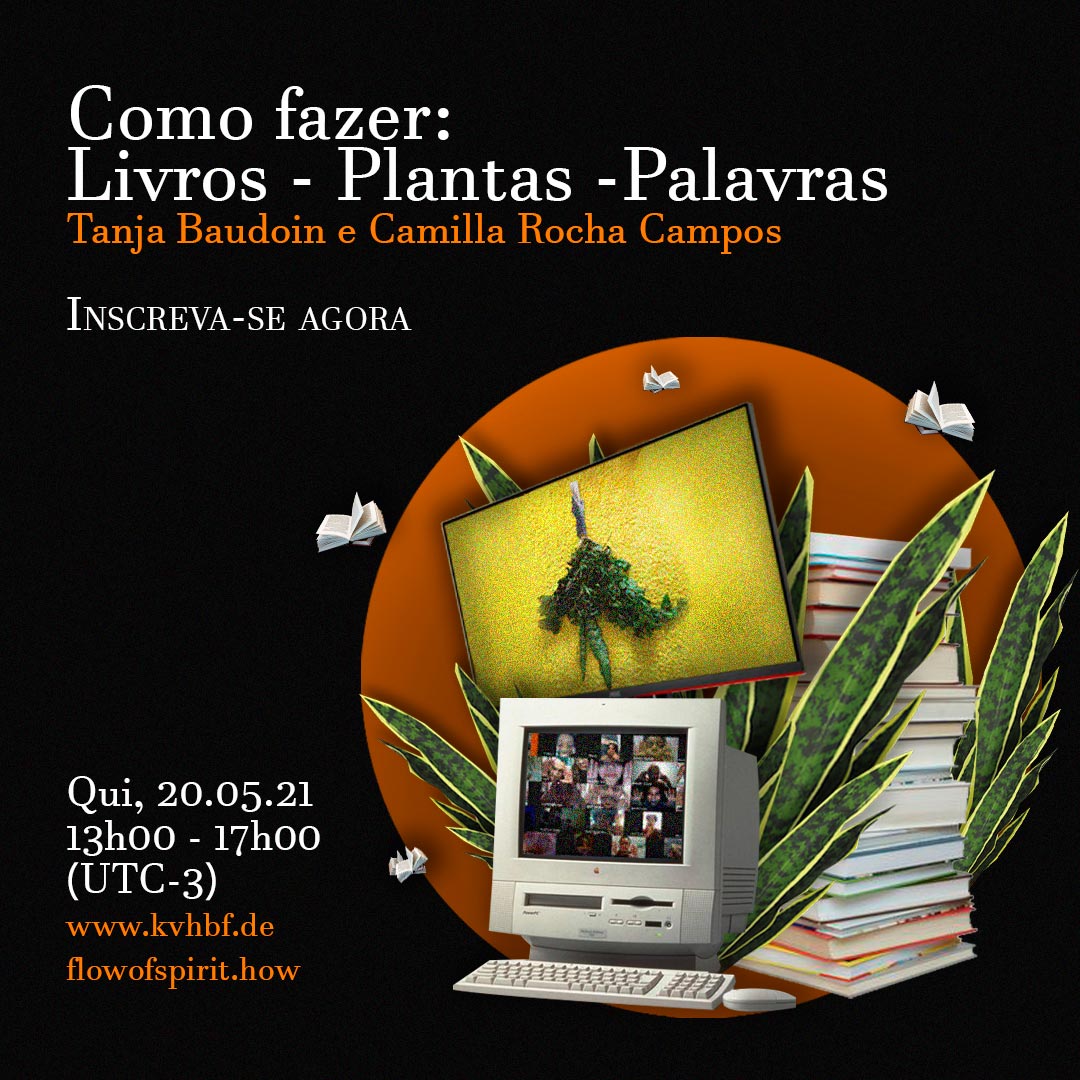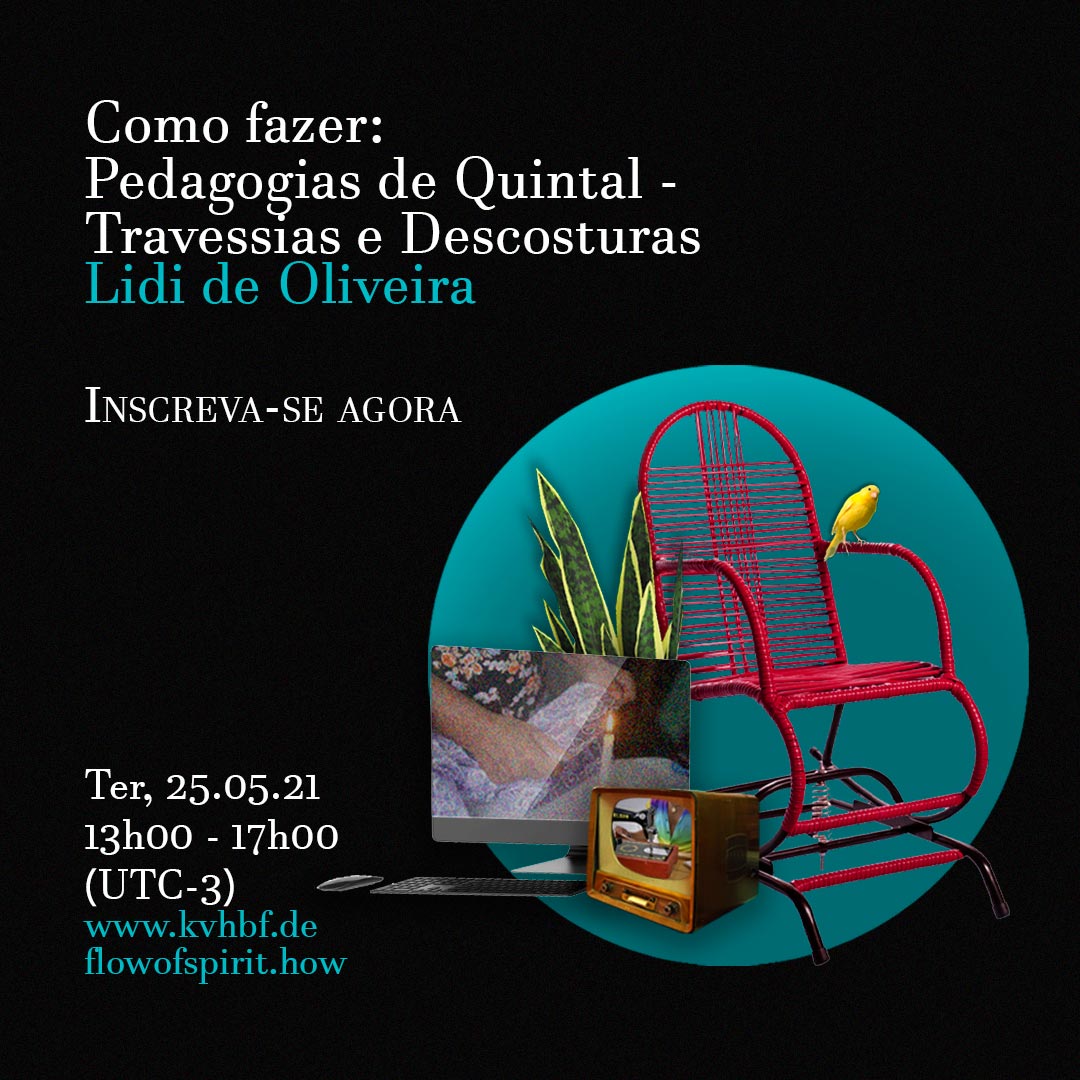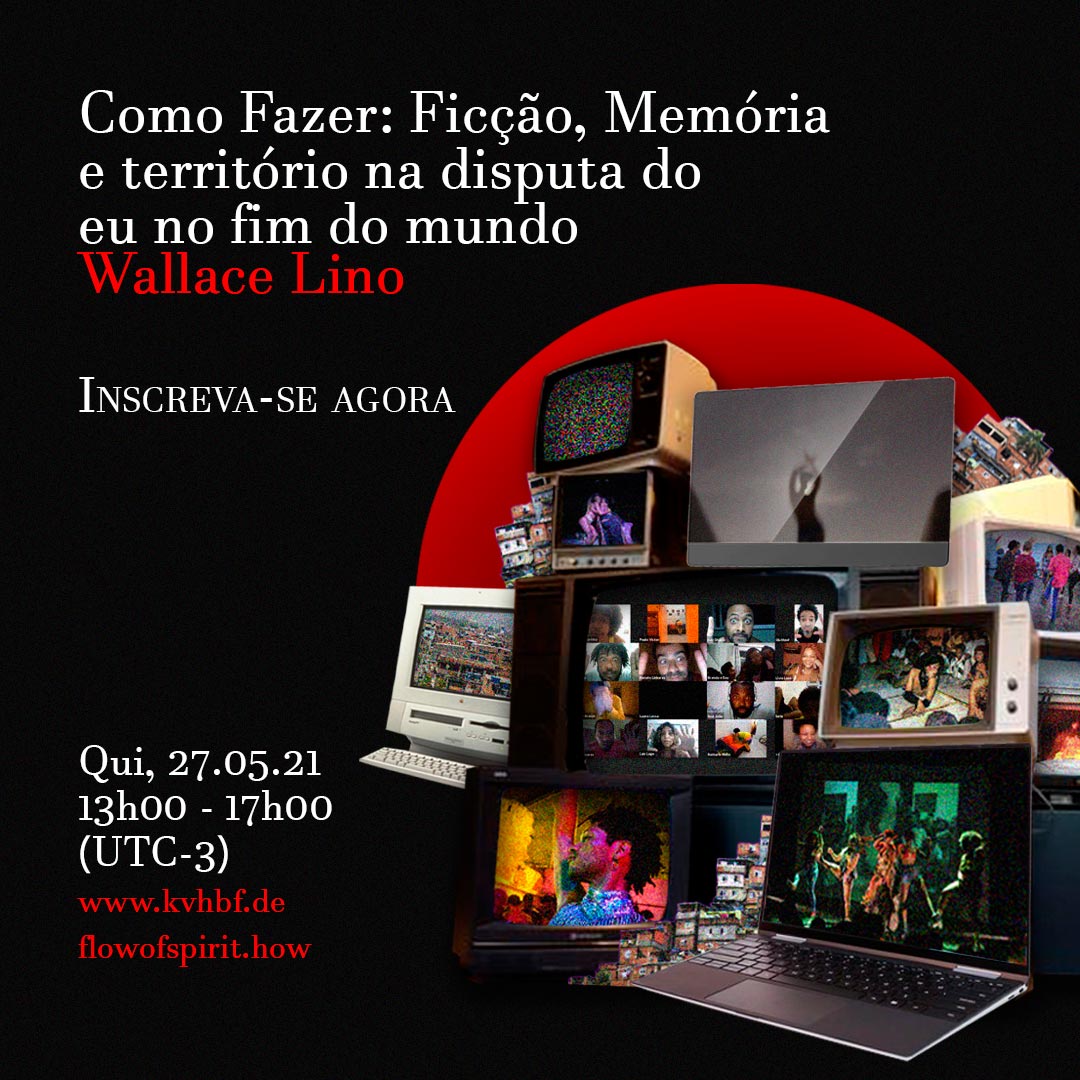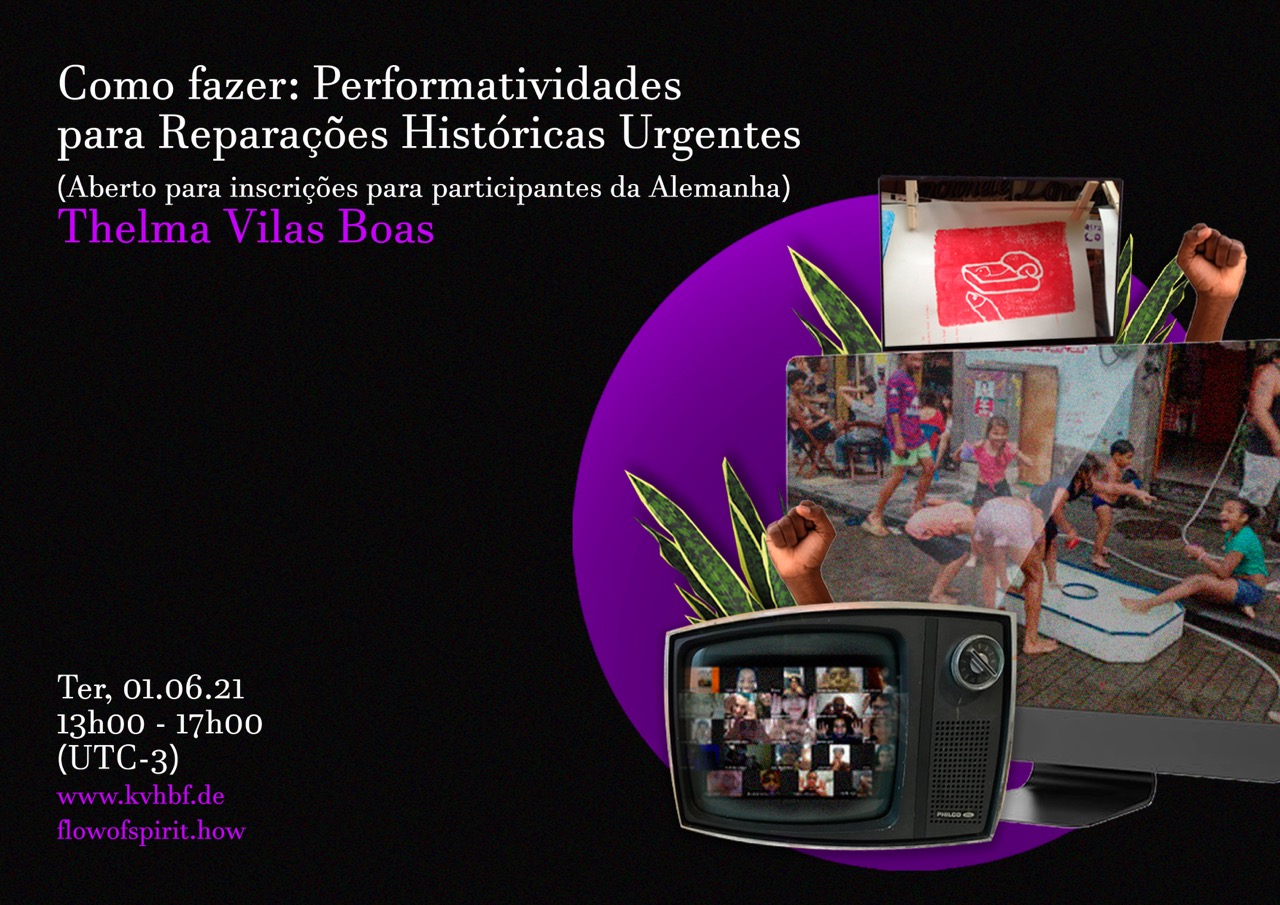
How To: Performativities for Different Bodies
Como fazer: performatividades para diferentes corpos
20, 25, 27 May and 1 June 2021
Online workshop series between Rio de Janeiro, Brazil and Hamburg, Germany
Registration open until 10 May 2021
Register here
How To: Performativities for Different Bodies is a virtual workshop series taking place on four afternoons / evenings in May 2021 between Rio de Janeiro, Brasil and Hamburg, Germany. Combining theory and practice we would like to create contexts that keep in mind and expose the historical, social and economic entanglements and imbalances between the two societies. At the same time within the workshops we would like to imagine a different ethical and (aesthetic) present. We propose the project as an extensive exercise in translation between language and gesture, across cultures and geographical distance, not disguising all the problematics, miscommunications and impossibilities that are concomitant with it.
In four workshops, each consisting of a theoretical and a practical part, we focus on perspectives on body politics, social relationships, collective learning and community knowledge. The invited artists share their practices to consider existing colonial conditions as well as to move and articulate the bodies present.
Schedule:
| 20 May: | "How To: Books - Plants - Words" with artist / curator Camilla Rocha Campos and
curator Tanja Baudoin; More information |
| 25 May: | "How To: Pedagogies of the Backyard - Transversing und Cutting of Seams" with
artist, social
scientist and seamstress Lidi de Oliveira; More information |
| 27 May: | "How to: Fiction, Memory und Territory and Controversy over the Self at the End
of the
World" with researcher-actor-director Wallace Lino; More information |
| 1 June: | "How to: Performativities for urgent historical reparations" with the artist
and organizer
Thelma Vilas Boas, initiator of the feminist bar / school for children "Lanchonete <>
Lanchonete" in Rio de Janeiro; More information |
| 13 – 17 h (UTC-3), 18 - 22 h (CET) | |
The workshops will be carried out as a Zoom meeting in Portuguese and German with live translation. Registration is free and open to everyone, with a maximum of 15 participants in Brazil and 15 participants in Germany. There are no special requirements.
The workshops are conceived as a series; participation in individual workshops is possible, but we recommend participating in all of them if possible. We will get back to you by May 14, 2021 as to whether you can participate in the workshop(s) for which you have registered.
A project by Kunstverein Harburger Bahnhof.
Initiated by Tanja Baudoin, Oliver Bulas, Camilla Rocha Campos and Annette Hans as a partnership
between several accomplices in Brazil and Germany. Live translation by Karla Mendonça dos Santos
Dany.
Graphics: Matheus Affonso.
Register here

Tanja Baudoin, Camilla Rocha Campos: "How to: Books - Plants - Words"
Thu, 20 May, 2021, 1 – 5 pm (UTC-3) / 6 - 10pm (CET)
Camilla Rocha Campos is a self-revolutionary artist*, teacher, curator and author who is currently working as curator of the art residencies at MAM-Rio. Tanja Baudoin is a Dutch curator who has lived in Rio for 6 years. Until recently she worked in the library of the Escola de Artes Visuais in Parque Lage, where she presented Rocha Campos' performance "Livro Xaxará", in which the capabilities of the body were manipulated to carry a collection of books within and on the edge of itself. The workshop “How to: Books - Plants - Words” by Rocha Campos and Baudoin examines how we can use our senses to question and transform the production of knowledge by observing how we interact with places and objects of knowledge, such as books, plants, voices and our bodies within our own four walls. Sometimes our "sources" of knowledge are more one-dimensional and more fixed than we are aware of ... Can we shake this supposed security, find new sources, involve other voices? Where do we start our research? Or how can we begin to build, feed or transform these sources? What can we share with others? How does what we read and ingest reflect who we are? What new ways of looking at this can we find? How can others help us broaden our perspective? These topics are examined in the workshop using choreographies of everyday life with objects, gestures and words. Rocha Campos and Baudoin share examples of their practices, create a collective visual essay with the participants and go in search of other than verbal forms of communication.
Camilla Rocha Campos is an artist, lecturer and author. Labeling herself a self-revolutionary, her practice envisages collective systems to undermine the mechanisms of social and intellectual distinctions that establish power hierarchies. She has a master's degree in theory and art criticism at UERJ and is part of platform 0101 for the dissemination of Afro-Diasporic art. She is director of the international art residence Capacete in cooperation with MAM Rio as well as lecturer and member of the education council of the School of Visual Arts in Parque Lage.
Tanja Baudoin (*1984, Netherlands) came to Brazil in 2015 when she took part in the CAPACETE Artistic Residency Program and has lived there ever since. She has a Masters in Art History from the Universiteit van Amsterdam (2008) and a Masters in Contemporary Art from the Universidade Federal Fluminense (UFF) in Niteroi (2019). She was curator in the library / documentation and research center of the School of Fine Arts of Parque Lage in Rio de Janeiro from 2019-2020 and was a lecturer at the same school from 2016 to 2018. From 2010 to 2015 Baudoin was part of the curatorial team of “If I Can't Dance I don't Want to Be Part of Your Revolution” in Amsterdam. She is currently organizing the project of the reading and translation group for independent publishing practice together with Ana Luiza Fonseca and the publishing house par(ent)esis.
Register here

Lidi de Oliveira: "How to: Pedagogy from the backyard - from crossing and separating the seams"
Tue, May 25th, 2021, 1 – 5 pm (UTC-3) / 6pm - 10pm (CET)
In the backyards of the seamstresses in Parque Paulista, a district on the vast outskirts of Rio de Janeiro, de Oliveira has observed the creative practices that she describes as “Pedagogy from the backyard”. By this she means the oral transmission of knowledge between women of different ages, young and experienced creators who have developed their own forms of assembling materials, resisting between thread - machines - plants, conveying made identities and memories and dressing bodies. In traversing the pandemic moment, creation gives the peripheral bodies (in their production processes) a breathing space. De Oliveira would like to use this to bring about a change in (fashion) creation, in which the fabrics - poetry - colors - needles - Velcro fasteners - body - energies are used to show what penetrates territories and gazes. In the workshop, de Oliveira introduces creative possibilities with fabrics: sewing with a needle and thread, making seams with the help of candles, simple embroidery and yo-yo techniques. The connecting thread is the reflection on what the participants in Rio want to communicate to the participants in Hamburg through their fabric, and what the people in Hamburg want to share with Rio. Glances - voices - unrest - revolts - healing - communication, stories about oneself, about territories, about living through the current situation and the breaking up of geographical structures are revealed in the textiles. The fabrics are identities: they are know-how handed down over generations, they can clothe us, they can communicate to us, give signs and break the verbal languages. Expressed in the textures and the knowledge of textiles, it is about sharing what the participants send on the (transatlantic) crossing, or also about separating them.
Lidi de Oliveira: Multi-artist from the fourth generation of a family of seamstresses, grew up in Rio's suburb Baixada Fluminense. In 2020/2021 De Oliveira was Artist in Residence in the MAM-RJ / CAPACETE residency program, where she developed the methodology of pedagogy from the backyard. In 2016 she initiated the Costura Nem project at Casa Nem (a well-known refuge and support center for the LGBTQ population of Rio) with free courses on fabric design for trans people. Since 2017 De Oliveira has been coordinator of the Laboratório Arremate, a mobile space for peripheral fashion creation. She gives workshops on i.a. Costuras Periféricas (peripheral tailoring) and sewing skills as a tool for financial autonomy for women on the periphery. As a filmmaker, De Oliveira realized the web series Costura de Resistência (Sewing of Resistance) and the documentary Costura de Memórias (Sewing of memories). Between 2017 and 2020 she published poems with various publishers and magazines. She is a member of Voz da Baixada (voice of the Baixada), an activist with Movimenta Caxias and a collaborator of the Perifa Connection, in connection with which she has published a variety of articles in newspapers and magazines. De Oliveira is an independent researcher of poetics from the point of view of seamstresses from Baixada Fluminense.
Register here

Wallace Lino: "How to: Fiction, Memory and Territory and the Controversy over the Self at the End of the World"
Thu, May 27th, 2021, 1 – 5 pm (UTC-3) / 6pm - 10pm (CET)
Wallace Lino is a black LGBTQIA multi-artist and has worked for over 15 years in theater groups and collectives that were founded in the favela Maré. The workshop is based on the experiences gathered on topics such as: memory, race, gender, sexuality and territory, as well as countless data. Together with the participants Lino wants to initiate collective oral fictions as well as question everyday life and the self. The Brazilian Atlas of Violence 2019 points to the increase in racial inequality between "blacks" and "non-blacks" in Brazil: 75.5% of the murder victims in 2017 were black and pardos (mixed ethnic background), which are also more vulnerable socially and economically. The historical and socio-structural dynamics of the colonial country of Brazil lead, despite important advances in the legislation of Brazil and the world in the area of the LGBTQIA agenda, to an overarching connection between racism on the one hand and violence in relation to gender and sexuality on the other. The black LGBTQIA population is facing extermination, annihilation and daily socio-economic vulnerabilities. At the present moment of the pandemic, it is especially important to draw attention to the existence and narratives of bodies that are as excluded from history as they are from Brazilian society and its rights. In 2020, solitude and isolation limited experience to the virtual, in which it was confined to a merging of events, model relationships and socio-economic vulnerabilities. Artistic actions were also narrowed to the same virtual experiences, which almost forced them to question everyday life. In this new reality, interpersonal relationships exist as constant linguistic productions, mediated by cameras, cell phones and computers, which together create a kind of large live cinema or camera theater. Based on these conditions, the workshop aims to develop fictions that interweave in our reality in order to produce new fictions in the middle of the end of the world.
Wallace Lino: researcher, actor, director, playwright and educator. University graduate theater teacher at UNIRIO, is currently writing his master's thesis as part of the Brazilian government-run CEFET program on ethnic relations. Since 2005 co-founder and member of Cia Marginal, a theater ensemble in the Favela Maré. Lino is co-founder of the group, Atiro 2016 and works there as a director and playwright. As a writer, director and dramaturge, he worked among others. involved in Corpo Minado em Quarentena (2020), Família Virtual (2020) and Quintal C11 (2020). In addition to participating in the project Entidade Maré (2020), Curta Entidade (2020) and Radio no lance (2020).
Register here

Thelma Vilas Boas: "How to: Performativities for Urgent Historical Reparations"
Tue, June 1st, 2021, 1 – 5 pm (UTC-3) / 6pm - 10pm (CET)
Vilas Boas is the initiator of “Lanchonete <> Lanchonete” in the Gamboa district of Rio de Janeiro, which is also called “Little Africa” (Pequena África) by the inhabitants. “Lanchonete <> Lanchonete” acts there as a meeting point for critical reflection, as a school and as a communal kitchen, which is why a wide range of different visitors come together in the space. In her workshop, Vilas Boas deals with the economic and social conditions and the conflicts with which the descendants of the pre-Columbian population and the African slaves are confronted as a consequence of European colonization. In order to illustrate the complexity of the relationships around “Lanchonete <> Lanchonete”, the workshop begins with the voice and bodies of people from the surroundings that use the space and that reveal the reality in which they live. In “Lanchonete <> Lanchonete”, three potentially political dispositives of the kitchen are then activated. On the basis of these impressions, a practical part of the workshop follows with the participants, in which they develop strategies and possibilities for practical influence and participation in changing the grievances. The workshop intends to interrupt the forgetting that occurs as soon as the participants finally turn off their webcams to get on with day-to-day business.
Thelma Vilas Boas: is a photographer and educator with a master's degree in fine arts from the Escola de Belas Artes do Rio de Janeiro. She completed postgraduate studies in documentary film at the Getulio Vargas Foundation. In 2018 she was visiting professor at the art faculty of the UFF in Niteroi. In 2019 she was visiting professor in the DESILHA course in the city of the graduate program for fine arts at the Escola de Belas Artes do Rio de Janeiro. Vilas Boas is currently coordinator for educational artistic practices in the squatting Bar Delas (Rio) and organizer of Escola Por Vir as part of the activities of the Lanchonete <> Lanchonete cultural association. In 2016 she took part in Move Arts Japan, a project to activate cultural spaces in peripheral regions of Japan at the 3331 Museum in Tokyo. In 2019 she was invited to a residency in connection with Casa do Povo in São Paulo and initiated DESLOCAR É PRECISO, for which 6 children from Pequena África traveled to São Paulo and spent the artist residence there with her while they critically reflected on the circumstances.
Register here
How To: The Flow of Spirit (Oliver Bulas & Annette Hans) have been realizing dialogical workshop situations in Hamburg, Berlin, Rio de Janeiro and Lyon since 2018. The aim is to learn or adopt other perspectives and modes of action of a practical kind in dialogical exchange processes in order to expand and reflect on social frames of action and to transfer them into alternative and collective social relations.